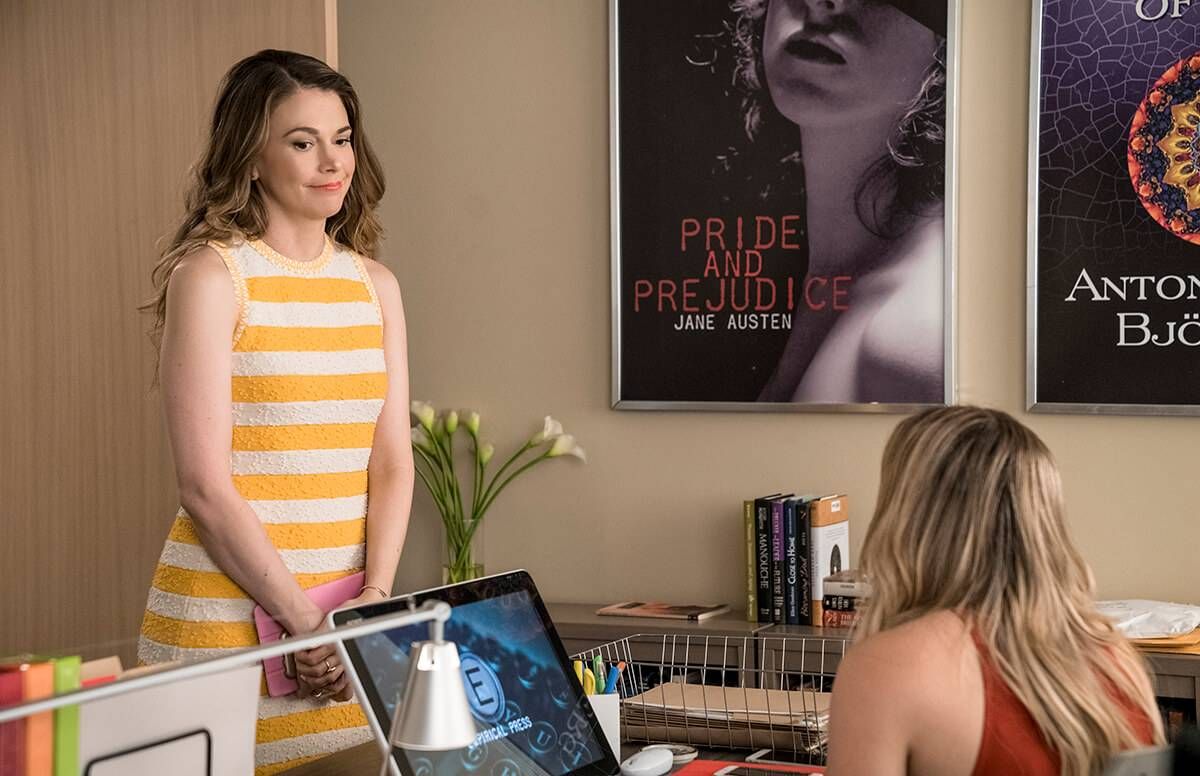What Older Workers Can Learn From TV's 'Younger'
The new season of the TVLand dramedy is just starting up
(With Season 5 of Younger premiering on TV Land Tuesday, June 5, Next Avenue is republishing this story about what older workers can learn from watching the show.)

If you haven’t yet tuned into the TVLand dramedy Younger, now’s the time to binge watch and soak up the intergenerational work/life lessons mixed within each storyline.
Younger is about 40-year-old, recently divorced Liza, who struggles to return to the promising publishing career she left years earlier after marriage and the birth of a daughter. The one-time whiz kid finds the young publishing bosses want to hire other Millennials, not a divorced mom with a daughter close to their age. So Liza hatches a plan to present herself as a 26-year-old, lands a job and then juggles her 40-something “real” life with her 26-year old “business” life.
Sure you need to suspend some logic. Yet watching mature, knowledgeable Liza acclimate to life as a Millennial offers many insights if you’re in your 40s, 50s or 60s and have a job or want one. Perhaps that’s one reason why the show enjoyed a 31 percent bump in viewers aged 25 to 54 between Season 3 and 4, according to Variety.
6 Workplace Insights From 'Younger'
Here are six workplace insights from Younger that can guide you toward harmony with younger colleagues:
1. You and Millennials often don’t speak the same language. That’s comically obvious when Liza is interviewed by two twentysomethings.
They can’t relate to Liza when she talks about her past career triumphs that occurred long before the days of rampant social media interactions. She can’t relate to them for many reasons, including their penchant for interrupting the job interview to gossip with each other about dates, parties and other women. They dismiss her as old; she dismisses them as childish.
Lesson learned: Of course, this scene was exaggerated, but it’s important to realize that generations communicate differently. Consider that younger people typically prefer less face-to-face contact than older ones. When they do converse at the workplace, they often stray into personal conversations. Expect that and try to adapt to a more casual interview style.
2. Allow younger workers to shine. Millennials want to make their marks in the business world. You may well understand that hunger because you likely felt the same way as an upstart. Rather than undermining your young colleagues by swiping their best ideas or treating them as personal assistants — as Liza’s fortysomething boss does to her and other young colleagues— encourage Millennials to speak to you as an equal and voice their ideas.
Lesson learned: Maturity is your superpower. Younger colleagues are hungrier for success than those of us who are older. Give them the opportunity.
3. Ask for help from Millennials. Yes, you have more world experience than your younger colleagues. But they have a lot to teach you, too. Liza doesn’t pretend she knows anything about social media and seeks out two 26 year-old colleagues, confessing her ignorance. They teach her. When she returns to her fortysomething life, she continues to ask younger and same-age colleagues for advice.
Lesson learned: You know a lot, but you don’t know everything. Ask younger colleagues for help and they’ll often (not always) share their knowledge.
4. Don’t “parent” younger colleagues. The don’t-do-it flip side of asking for help is parenting your young colleagues with unsolicited advice. Liza does that repeatedly when she’s in twentysomething mode. Her young colleagues challenge her, making it clear such meddling is unwelcome. The constant pushback prompts Liza to treat the twentysomethings at work as equals, even when she’s not working and is living her fortysomething life. When Kelsey, Liza’s 26-year old friend and colleague, rashly decides to quit her job, Liza (who had admitted her real age to Kelsey), counsels her as an equal. Kelsey follows her suggestions and decides not to leave.
Lesson learned: Young colleagues respond well to advice delivered by older ones who consider them peers.
5. Understand that youth is a social class. A critic at Atlantic magazine mentioned the social class point and it immediately made sense to me. Think of how you and your friends all understand the same cultural reference points. You move through life at basically the same speed, likely wear the same style of clothing and communicate through the same channels — typically in person, telephone and email. It’s the same for younger people. They share touchstones. They communicate digitally. They often have the same senses of style. They move at the same speed.
Liza originally stumbles in Younger because she tries to prod her Millennial colleagues to adopt the preferred media of her generation (in-person conversations) without embracing some of theirs (Twitter). Life improves when she stops.
Lesson learned: Youth is as much an attitude as an age. No one expects you to spend your days mastering Snapchat or shopping at Urban Outfitters. But don’t close yourself off from new experiences including current communication tools. Socialize with the group — just for a short time — after work. Listen to some music they recommend. Discover Twitter.
6. Stop using AOL. Seriously. The minute you tell a younger person to contact you through AOL or even Yahoo, you morph into Methuselah.
Lesson learned: You need Gmail.

